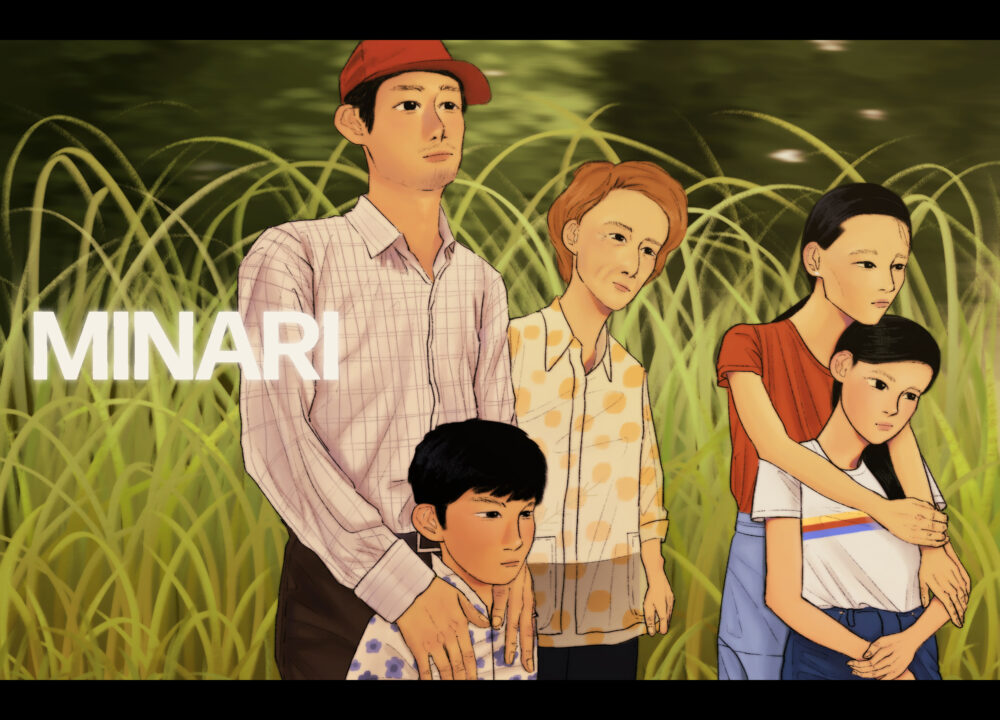
By Katy Nguyen
Thousands of miles away from home, minari seeds flourish nearby as a Korean-American family uproots themselves to rural Arkansas in hopes of starting their farming business from the ground up.
In Lee Isaac Chung’s “Minari,” the Yi family begins their pitch at pursuing the American Dream while navigating the ropes of farming and struggling to keep their family from falling into pieces.
Directed in a documentary-esque style and a semi-autobiography of Chung’s rural childhood upbringing in Arkansas, the film stars Steven Yeun, Han Ye-ri, Alan Kim, Noel Kate Cho, Youn Yuh-jung and Will Patton. In its world premiere at the Sundance Film Festival in 2020, “Minari” won U.S. Dramatic Grand Jury Prize and the U.S. Dramatic Audience Award.
The driving force of the Yi family comes from Jacob (Steven Yeun), who is determined to let his children see him succeed at cultivating a farm to sell produce to Korean American vendors. Monica (Han Ye-ri) undertakes the role of keeping the family together and tending for her son, David (Alan Kim), who has a heart condition.
When they arrive at the farm, Monica is wary and voices her displeasure at their living situation. Hearing their parents fight almost every day, the two children, David and Anne (Noel Kate Cho), fold paper airplanes in their rooms that they throw out as an attempt to stop the fighting. Living out of a trailer on an empty plot of land, Jacob begins looking for help to find water. While trying to start their business, both parents also work at sexing chickens at a hatchery close to their farm.
As the family adjusts to their new environment, they begin attending church on Sundays to assimilate in the predominantly white town.
“Minari” addresses the racial issues and microaggressions that the Yi family face through a subtle, almost brushed-under-the-rug way, such as when Anne is confronted by a white girl from the church who says a minute-long segment of phrases—like “ching chong”—to imitate the Yi and is asked to let her know when she says something that sounds like Korean.
It is evident the Yi feel struck by the interaction because they decide it may be better if they just work on their farm and at the hatchery on Sundays.
Monica continues to worry about David and his condition and wants someone to take care of him while she works—to which they arrange for Sunja (Youn Yuh-jung), Monica’s mother, to come from South Korea and look after the children.
As an unconventional grandmother, Sunja’s eccentric personality faces the challenges of building a bond with David, who has never seen her or knows what Korea is like. He refuses to share the same room as her and even goes to lengths to cause her trouble, saying, “Grandma smells like Korea,” as a negative aspect.
“Minari” captures a childlike innocence and carefreeness to the hardships that the parents face, such as when Sunja takes the children to explore the outdoors, an activity that Monica is strictly against due to David’s heart condition. They find a small stream where Sunja decides to plant the minari seeds that she brought over.
A story about family, resilience and hardships, “Minari” not only breaks barriers by earning six Academy Award nominations as a film directed by an Asian American but also has its dialogue primarily in Korean, almost to itself as a representation of what the American Dream really is for many immigrant families.
Yeun is also the first Asian American to earn a nomination for Screen Actors Guild for Outstanding Performance by a Male Actor in a Leading Role for his performance as Jacob Yi.
With a signature A24 soundtrack, “Minari” explores the nuances and rawness of emotions that are captured in the silent moments of the film that sometimes makes you laugh and others, cry.
“Minari” is not just a water plant that grows wherever it is planted; it represents the perseverance and determination to resonate with the stories about the Asian American upbringing and root itself in the audience’s heart.





